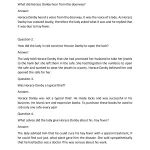What is the importance of effective communication in a professional setting?
Effective communication helps in building trust, resolving conflicts, ensuring clarity, and improving relationships in the workplace.
How does body language affect communication?
Body language can reinforce or contradict spoken words. Positive body language, like eye contact and open gestures, supports effective communication.
What is the difference between verbal and non-verbal communication?
Verbal communication uses spoken or written words, while non-verbal communication includes gestures, posture, facial expressions, and tone.
Define communication.
Communication is the process of exchanging information, ideas, or feelings between individuals or groups through speech, writing, or other means.
What are the barriers to communication?
Barriers include noise, language differences, cultural misunderstandings, emotional interference, and lack of attention.
What is active listening?
Active listening involves fully concentrating, understanding, responding, and remembering what is being said during a conversation.
Why is feedback important in communication?
Feedback ensures the message was received and understood, and helps in improving the clarity and effectiveness of communication.
Explain the process of communication.
The process includes the sender, encoding, message, medium, receiver, decoding, and feedback, often affected by noise.
What is the role of tone in communication?
Tone conveys emotion and attitude, and can influence how a message is received. A friendly tone invites openness, while a harsh tone can create tension.
How can one improve communication skills?
Practice active listening, read regularly, engage in conversations, seek feedback, and observe good communicators to improve skills.
What is meant by interpersonal communication?
Interpersonal communication refers to direct, face-to-face communication between two or more people involving verbal and non-verbal elements.
Differentiate between formal and informal communication.
Formal communication follows organizational structure and official channels; informal communication is casual and not bound by rules.
What is group discussion?
Group discussion is a form of communication where a small group of people exchange ideas on a specific topic to arrive at a conclusion.
Why are presentation skills important?
Presentation skills help convey information clearly and persuasively to an audience, making the communication effective and engaging.
What are communication ethics?
Communication ethics involve being honest, respectful, and responsible while sharing information, avoiding manipulation or misinformation.
What is a resume and why is it important?
A resume is a formal document that outlines a person’s qualifications and experience. It’s important for applying to jobs or academic opportunities.
What is the difference between a CV and a resume?
A CV is detailed and used for academic or research positions, while a resume is concise and tailored to specific job roles.
What is the purpose of a cover letter?
A cover letter introduces the applicant, explains the intent, and highlights qualifications relevant to the job being applied for.
What are soft skills in communication?
Soft skills include interpersonal abilities like teamwork, empathy, time management, and emotional intelligence that support communication.
Define empathy in communication.
Empathy is the ability to understand and share the feelings of another, which helps in building rapport and trust in communication.
What are the features of a good speaker?
Confidence, clarity, good body language, knowledge of the subject, and the ability to engage the audience are key traits of a good speaker.
What is non-verbal feedback?
Non-verbal feedback includes nodding, smiling, eye contact, or frowning, which provides cues to the speaker about how the message is received.
How does cultural difference impact communication?
Different cultures have unique communication styles, values, and interpretations, which can lead to misunderstandings if not respected.
What is a communication channel?
It refers to the medium through which a message is transmitted, like face-to-face, email, phone, or social media.
What are open-ended questions?
Open-ended questions cannot be answered with a simple yes or no. They encourage detailed responses and deeper discussion.
Why is clarity important in communication?
Clarity ensures the message is understood as intended, reducing the chance of confusion or misinterpretation.
What is the function of eye contact in communication?
Eye contact builds trust, shows interest, and helps regulate the flow of conversation.
How does listening differ from hearing?
Hearing is the passive reception of sound, while listening is an active process involving attention and interpretation.
What is persuasive communication?
It involves presenting arguments in a way that convinces others to accept a point of view or take a specific action.
What are communication objectives?
Objectives include informing, educating, persuading, and entertaining the audience.
How can stress affect communication?
Stress can cause misunderstandings, poor word choice, and difficulty in processing information, leading to ineffective communication.
What is digital communication?
Digital communication uses electronic devices and platforms like email, chat, and social media to exchange information.
What is the purpose of a group presentation?
Group presentations divide content among members to present a unified topic collaboratively, showcasing teamwork and communication skills.
Define decoding in the communication process.
Decoding is the process of interpreting the sender’s message by the receiver to derive meaning.
What is the importance of audience analysis in communication?
Understanding the audience helps tailor the message, tone, and medium to ensure better reception and engagement.
What are communication skills in customer service?
They include politeness, patience, clear articulation, empathy, and the ability to handle complaints effectively.
What is the role of communication in leadership?
Leaders use communication to inspire, instruct, and guide their teams toward achieving goals.
How does communication build relationships?
It fosters understanding, trust, and emotional connection, which are essential for healthy personal and professional relationships.
What is telephone etiquette in professional communication?
It involves answering promptly, using a polite tone, identifying oneself, listening carefully, and summarizing the call if needed.
What is written communication?
It is the exchange of information through written symbols, including letters, reports, emails, and memos.
How is assertive communication different from aggressive communication?
Assertive communication expresses needs respectfully, while aggressive communication is forceful and often disrespectful.
What are the qualities of an effective email?
Clarity, conciseness, proper grammar, a clear subject line, and an appropriate tone make an email effective.
What is paraphrasing in communication?
Paraphrasing is restating someone’s message in your own words to confirm understanding.
How do emotions influence communication?
Strong emotions can cloud judgment, affect tone, and lead to impulsive reactions, impacting communication negatively.
What is feedback loop in communication?
It is the process where the receiver responds to the sender, completing the communication cycle and ensuring mutual understanding.
How does social media influence communication?
It allows instant sharing and interaction, but can also cause misunderstandings due to lack of tone and context.
What is a communication strategy?
It is a plan that outlines how, when, and what to communicate to achieve specific goals effectively.
What are listening barriers?
They include distractions, prejudices, emotional noise, and poor concentration that prevent effective listening.
How can one develop public speaking skills?
Practice regularly, get feedback, study great speakers, prepare well, and manage anxiety to improve public speaking.
What is the role of humor in communication?
Humor can lighten the mood, make content more memorable, and build rapport if used appropriately.
Recommended Indian Books for Kannur University Communicative English Question Paper Preparation
-
Communicative English – Dr. K. V. Dominic (Authorspress)
Focuses on basic grammar, sentence construction, conversation practice, and short essays. Useful for grammar-based and spoken English questions. -
English for Effective Communication – Krishna Mohan & Meera Banerji (Macmillan India)
Covers professional communication, group discussions, listening skills, and presentation techniques. Ideal for question papers involving workplace communication. -
Business Communication – Meenakshi Raman & Prakash Singh (Oxford University Press)
Includes case studies, email writing, reports, and formal letters. Great for practical application-type questions. -
Technical Communication: Principles and Practice – Meenakshi Raman & Sangeeta Sharma (Oxford University Press)
Focuses on technical writing, visual aids, and report formats. Helpful for objective and short answer questions on professional writing. -
Functional English – Renu Gupta (Cambridge University Press)
Simplifies functional grammar, vocabulary usage, and real-life communication scenarios. Good for MCQs and fill-in-the-blank types. -
Strengthen Your English – Bhaskaran Nair (Orient BlackSwan)
Offers grammar drills, sentence correction, and error spotting. Supports revision for grammar-heavy sections in exams. -
English at the Workplace – M. Ashraf Rizvi (Tata McGraw-Hill)
Covers resume writing, interviews, business meetings, and email formats. Best for practical and descriptive questions. -
A Course in English Communication – J. Vilanilam (BPH Publications)
Emphasizes speech, articulation, body language, and phonetics. Useful for oral communication and phonetics-based questions. -
Essentials of English Grammar and Composition – Rajendra Pal & J. S. Korlahalli (S. Chand)
Includes grammar rules, letter writing, paragraph construction. Good for both short and long descriptive questions. -
Communicative English for Undergraduates – S. Jayashree & B. Anuradha (Emerald Publishers)
Designed for university-level learners with model question papers and exercises. Aligns closely with Kannur University paper format. -
Mastering English Grammar – S.C. Gupta (Arihant Publications)
Packed with grammar rules, sentence transformation, and practice sets. Ideal for quick practice and revision. -
Developing Communication Skills – Krishna Mohan & N.P. Singh (Macmillan India)
Includes soft skills, non-verbal communication, and listening comprehension. Suitable for theory and comprehension-based questions. -
English Grammar in Use – S. R. Inthira (Emerald Publishers)
Targets Tamil Nadu and Kerala university students with contextual grammar. Good for region-specific syllabus alignment. -
Effective English Communication – V. Sasikumar & P.V. Dhamija (Tata McGraw-Hill)
Offers spoken English, group task strategies, and conversation models. Excellent for viva and interpersonal skill prep. -
Spoken English – A Self Learning Guide – Kiranmai Dutt & Geetha Rajeevan (Foundation Books)
Encourages self-study in pronunciation, dialogue, and spoken interaction. Useful for dialogue writing and role-play. -
Academic Writing and Communication Skills – Subhash Jain (Lexicon Books)
Covers essay writing, reports, referencing styles, and academic vocabulary. Perfect for long answer writing practice. -
Objective General English – R.S. Aggarwal (S. Chand)
Objective questions, vocabulary tests, synonyms, antonyms, and sentence corrections. Ideal for competitive pattern sections. -
Fluency in English – Part 1 – Z. N. Patil, T. Bruthiaux (Oxford University Press)
Focuses on fluency, reading comprehension, and critical analysis. Great for reading-based and interpretation questions. -
English Language Practice – Renu Anand & R. Joseph (Cambridge University Press)
Grammar worksheets, error detection, dialogue building, and situational responses. Excellent for hands-on practice. -
Practical English Usage for Students – K. Elango (New Century Book House)
Contains practical examples, frequently used expressions, and common errors. Useful for real-world English application questions.
Let me know if you’d like this formatted for print, made into a study guide, or categorized by difficulty or syllabus unit!
Kannur University Communicative English Question Paper: A Complete Guide for Students
Kannur University’s Communicative English course is a vital part of the undergraduate curriculum, aiming to enhance students’ language skills for academic and professional success. The Kannur University Communicative English question paper is designed to test not only grammatical accuracy but also practical communication skills in real-world contexts.
Understanding the structure and style of the question paper is key to effective preparation. Typically, the paper includes sections like grammar, reading comprehension, writing skills, and vocabulary. These are aimed at assessing the students’ ability to use English in both formal and informal situations.
Students can expect questions on parts of speech, sentence transformation, error correction, and usage-based grammar. These test foundational knowledge and are usually objective or short-answer in format. Mastering these areas helps in securing easy marks and sets a strong base for the more complex sections.
Another major component is reading comprehension. Passages are taken from various genres, and students are asked to answer questions that test their understanding, interpretation, and vocabulary usage. This section promotes analytical thinking and reading speed—essential skills for higher studies and competitive exams.
The writing section focuses on practical application. Students are asked to write letters, emails, essays, reports, and notices. For job-oriented skills, questions on resume writing, cover letters, and memos are also commonly included. These tasks prepare students for real-life professional scenarios and are evaluated based on clarity, tone, structure, and language.
Listening and speaking modules may not always be part of the written exam but are integral to the course. However, questions may test theoretical knowledge of phonetics, articulation, and listening skills through indirect means such as matching exercises or short descriptions.
To excel in the Kannur University Communicative English question paper, students are advised to follow a consistent and structured approach. Start by reviewing the syllabus in detail and categorize topics based on difficulty. Use previous year papers and model questions to familiarize yourself with the pattern.
Reading newspapers, short stories, and editorials in English can significantly improve vocabulary and comprehension. Practicing paragraph writing and summarizing helps in gaining better command over the language. Speaking with peers in English, even casually, can boost confidence and fluency.
For grammar, focus on daily practice. Choose topics like tenses, prepositions, articles, and active-passive voice. Keep a notebook for common errors and tricky sentence patterns. Revisit them frequently before exams.
Vocabulary building should be part of your daily routine. Learn five new words a day with their meanings, synonyms, antonyms, and usage in sentences. This small habit can make a big difference in comprehension and writing tasks.
Group discussions and presentations, though not always evaluated in written exams, should not be ignored. Practicing these helps develop clarity in speech and organization in thought—skills that are also tested indirectly through essay and report writing questions.
Using flashcards, grammar apps, and voice recorders can make learning more interactive and less monotonous. Peer reviews and mock tests are also valuable tools for identifying weak areas and measuring progress.
With smart preparation and the right resources, students can approach the Kannur University Communicative English question paper with confidence and clarity.
FAQ for Kannur University Communicative English Question Paper
What is the exam pattern for the Kannur University Communicative English question paper?
The question paper generally includes sections on grammar, vocabulary, reading comprehension, and writing skills. It may also include short notes, essay-type questions, and application-based tasks like letter or email writing.
How many marks is the Communicative English paper usually worth?
The total marks typically range between 75 to 100, depending on the course structure and semester. It’s best to check your specific syllabus for confirmation.
Are previous year question papers available for practice?
Yes, students can access previous year question papers from the university library or their department. Practicing these helps understand the question trends and format.
Which topics are frequently repeated in the question paper?
Common topics include tenses, voice change, direct-indirect speech, error correction, essay writing, and reading comprehension.
What kind of writing tasks are usually included?
Tasks often include formal and informal letters, resumes, cover letters, short essays, reports, notices, and email writing.
Is there any spoken or listening component in the exam?
The written exam focuses on reading and writing. However, classroom assessments may include listening and speaking components for internal marks.
How should I prepare for the vocabulary section?
Read newspapers, underline unfamiliar words, and maintain a vocabulary journal. Focus on synonyms, antonyms, one-word substitutions, and contextual usage.
Are grammar questions objective or descriptive?
Grammar questions are usually objective (fill-in-the-blanks, multiple choice) but may also include short descriptive formats like sentence correction and transformation.
Do I need to study phonetics for this exam?
Basic knowledge of phonetics, stress, intonation, and pronunciation may be tested indirectly through theory-based questions, depending on the syllabus.
How important are presentation and neatness in answers?
Clear handwriting, well-structured answers, and proper formatting (especially in letters and essays) can earn better marks.
What resources are recommended for exam preparation?
Use university-prescribed textbooks, grammar workbooks, vocabulary builders, and previous year question papers. Group discussions and mock tests also help.
Can I use informal language in essay or letter writing tasks?
No. Use formal and grammatically correct English in all written tasks unless specifically asked to write an informal letter or dialogue.
Is internal assessment part of the overall marks?
Yes, most courses include internal assessments such as assignments, presentations, or class tests, which contribute to the final grade.
Are there any model papers provided by the university?
Sometimes departments provide model papers or sample formats to guide students. You can request them from your course instructor or department head.
How can I manage time during the exam?
Practice time-bound writing tasks. Allocate time for each section and stick to it. Don’t spend too long on one question.
What’s the best way to score high in this paper?
Practice regularly, revise grammar thoroughly, attempt sample questions, and improve your writing through daily practice and feedback.
Latest Posts
- Step-by-step guide to download and apply for jee mains admit card 202
- Comprehensive 2025 government holidays and recruitment details for job seekers
- JEE Mains Admit Card 2025: Your Step-by-Step Guide to Downloading the Hall Ticket
- Everything You Need to Know About 2025 Government Holidays Recruitment
- Comprehensive Guide to rrb d group recruitment 2025 – Eligibility, Vacancies, and Application
- Detailed guide to nps trust recruitment 2025 vacancies, eligibility and apply process
- Comprehensive guide to hpcl recruitment 2025 notification, vacancies, and application process
- ignou bed admission 2025 complete recruitment guide with eligibility and process
- Comprehensive Guide to Indian Army Agniveer Recruitment 2025 Notification and Jobs
- Everything You Must Know About CBSE Board Exams 2025 Changes & New Rules






